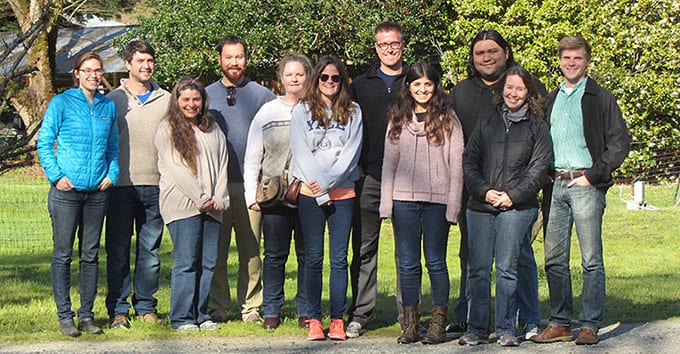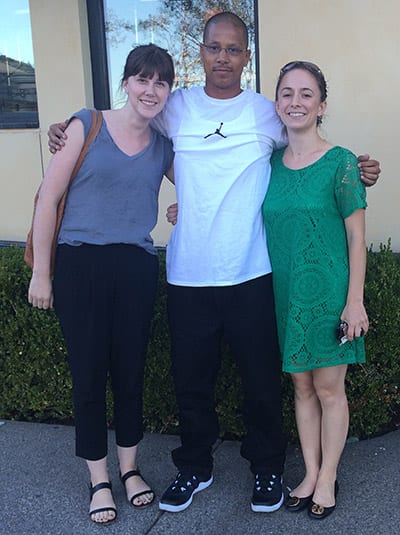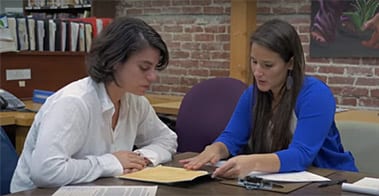
By Andrew Cohen
Law students are increasingly hungry to work with clients as early as possible. While such opportunities are rare at most law schools until students reach their second year, at Berkeley Law—thanks to the school’s Student-Initiated Legal Services Projects—they can dive in almost immediately.
These pro bono projects, founded and operated by students, identify a legal need, recruit supervising lawyers, and enlist classmates to serve the disadvantaged. The 23 active projects address areas such as immigration, housing rights, foster care, and veterans’ assistance. Participating students become more attuned to community needs—and more attractive to legal employers.
“Many of our students applied to law school because they wanted to make a difference in the world,” said Clinical Professor Ty Alper, Berkeley Law’s associate dean for experiential education. “The opportunity for these kinds of experiences right off the bat reminds them of their motivations, exposes them to clients in desperate need of legal representation, and lets them begin to develop some basic lawyering skills.”
Here’s a look at three such projects that are making an impact:
Empowering parole
The Post-Conviction Advocacy Project (P-CAP) trains Berkeley Law students to assist inmates with the parole process. They are supervised by attorney Keith Wattley of the Oakland nonprofit UnCommon Law, which works with long-term prisoners to gain their release. Because indigent prisoners often receive inadequate representation from parole board-appointed attorneys, student can play a vital role.

As a 1L, P-CAP co-leader Lilliana Paratore ’17 “knew I wanted to get out of the classroom and immerse myself in direct client interactions within the criminal justice system. Working with my client that year didn’t disappoint, as I had the incredible opportunity to successfully argue for granting his parole.”
Fellow group leader Madeline Bailey ’16 calls P-CAP “without a doubt the most inspiring aspect of my law school experience” and said it “solidified my commitment to a legal career working toward criminal justice reform.”
Some 15 P-CAP students are working with clients over the course of the school year, steadily developing trusting relationships. That trust is crucial in the parole context, Paratore noted, as “prisoners must articulate thoughtfully the factors that led to their crime. This often involves deeply personal and traumatic experiences that clients aren’t comfortable sharing immediately.”
Since the group launched two years ago, students have secured the release of 11 life prisoners—achieving a 61-percent success rate in their hearings.
Bailey would “challenge anyone to spend time getting to know our clients and still believe that something good is coming of them being locked up. Most of these people have experienced persistent abuse or huge tragedy, and all of them have experienced structural discrimination. It’s an honor to use the skills we’re developing at Berkeley Law to get them back with their parents, partners, kids, and communities.”
Helping low-wage workers
At the Workers’ Rights Clinic (WRC), Berkeley Law students advise low-income workers facing employment-related legal problems. Partnering with San Francisco’s Legal Aid Society Employment Law Center, the group holds 21 annual sessions in which students meet one-on-one with clients. They then confer with a supervising attorney to identify issues and possible remedies.
Before coming to Berkeley Law, many WRC students had worked on employment issues as community organizers and as legal, administrative, and paralegal support staff at plaintiff-side employment firms. “We all share a common commitment to preserving human dignity for the working poor and advocating on behalf of labor,” said DeCarol Davis ’17, who leads the clinic with fellow directors Scott Templin ’17, Molly Frandsen ’17, and Lizzie Fulton ’17.

WRC has served East Bay workers for more than a decade, helping on issues such as wage theft, racial discrimination, sexual harassment, and workers’ compensation. Students receive nine training sessions in employment law before advising clients, referring them to agencies to file claims, and explaining the relative strength of their case.
The students also sharpen their courtroom advocacy skills by directly representing clients in unemployment insurance hearings—where they have a near-perfect record.
Templin explained that WRC’s work “reveals deficiencies in the law and gaps in knowledge about employee rights, both on the part of employees and employers” and that students learn “the many paths lawyers can take to address workers’ rights—including community education, policy advocacy, and impact litigation.”
Advocating for a local tribe
As a Native American, Hayley Carpenter ’16 recognizes the myriad challenges that tribes face across the country. Eager to address them, she helps spearhead the Karuk-Berkeley Collaborative (KBC), which assists the Karuk Tribe of Northern California in two main areas: natural resource management and intellectual property.
A member of the Muscogee Creek Nation of Oklahoma, Carpenter calls KBC “a great opportunity to engage with these interests and get to know a great network of California Native people. We have frequent conversations with tribal leadership about the tribe’s areas of need.”
KBC’s environmental work includes efforts to protect native fish species such as the California native coho salmon, which has significant historical and cultural value to the Karuk Tribe. Students are also conducting research to assess the rights of mining claimants on public lands.
On intellectual property, KBC aims to protect the tribe’s way of life. Students work on issues surrounding the Native American Graves Protection and Repatriation Act, and on trademark and copyright questions regarding use of the tribe’s name, symbols, and practices. Last year, they conducted a property law research project that helped secure access to a piece of land the tribe deemed culturally important.
Carpenter headed Yale’s Association of Native Americans during college before spending two years at the American Indian College Fund. She credits KBC for giving her “a more holistic view of the legal process and a greater perspective on the legal tools used in advocacy. It’s not always the best approach to sue someone. Sometimes, you and your client need to come up with a more creative option.”